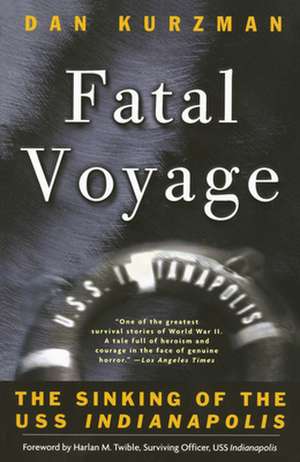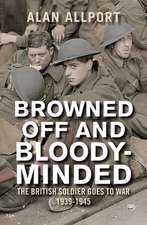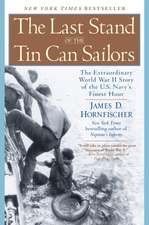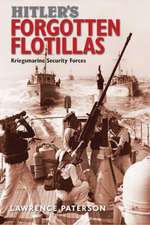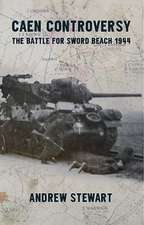Fatal Voyage: The Sinking of the USS Indianapolis
Autor Dan Kurzman, Kurzmanen Limba Engleză Paperback – 31 iul 2001
Drawn from definitive interviews with key figures, Fatal Voyage recounts the horrific events endured as the number of water-treading survivors dwindled to just 316. Each gruesome day brought more madness and slow death, from explosion-related injuries, dehydration, and, most terrifying of all, shark attacks. But the pain did not end when the men finally returned home: The Indianapolis’s commander, Captain Charles B. McVay III, was court-martialed for causing the clearly unavoidable disaster.
With a new afterword chronicling the fifty-five-year campaign by Indianapolis survivors and their supporters to win public vindication for Captain McVay, this classic is restored, along with memories of the Indianapolis crew.
Preț: 138.23 lei
Nou
Puncte Express: 207
Preț estimativ în valută:
26.45€ • 27.48$ • 21.97£
26.45€ • 27.48$ • 21.97£
Carte tipărită la comandă
Livrare economică 03-17 februarie 25
Preluare comenzi: 021 569.72.76
Specificații
ISBN-13: 9780767906784
ISBN-10: 0767906780
Pagini: 416
Ilustrații: BLACK & WHITE PHOTOGRAPHS
Dimensiuni: 140 x 216 x 30 mm
Greutate: 0.54 kg
Editura: BROADWAY BOOKS
ISBN-10: 0767906780
Pagini: 416
Ilustrații: BLACK & WHITE PHOTOGRAPHS
Dimensiuni: 140 x 216 x 30 mm
Greutate: 0.54 kg
Editura: BROADWAY BOOKS
Extras
I
The Victor and the Vanquished
THE TWO MEN furtively exchanged glances across the bare, whitewashed courtroom in the Washington Navy Yard, intrigued, it seemed, by the irony reflected in each other's eyes.
Captain Charles Butler McVay III, a strikingly handsome man with slightly pouting lips, dark, dramatically arched eyebrows, a stubborn chin, and graying hair, sat ramrod-straight in his chair, resplendent in his blue naval officer's uniform. His chest was ablaze with battle ribbons, one of them signifying the Silver Star, which he had won for displaying courage under fire.
Now, in December 1945, the forty-six-year-old skipper was under fire again, and his cool manner once more attested to his courage. But no medals would be won in this battle, and not even victory could remove the taint of the catastrophe that had befallen his men. About five months earlier, on July 17, McVay's heavy cruiser, the USS Indianapolis, sailed from San Francisco for the Pacific island of Tinian and, after unloading there the vital parts of the atomic bomb that would destroy Hiroshima, headed toward the Philippine Islands. En route it was sunk by a Japanese submarine, and only 316 out of 1196 men aboard survived--after floundering for five days in the shark-infested waters of the Pacific Ocean, most of them supported only by life preservers. It was the worst sea disaster in American naval history.
McVay, one of the survivors, was being court-martialed for "suffering a vessel to be hazarded through negligence" (failing to steer a zigzag course), and "culpable inefficiency in the performance of duty" (failing to make sure his crew abandoned ship in time). He was the first captain ever to be tried by the U.S. Navy for losing his ship in battle, and his pain was all the greater since his family was steeped in naval tradition.
And now, the final humiliation. There, sitting uneasily as a witness at the prosecution's table was Mochitsura Hashimoto, the thirty-six-year-old commander of the Japanese submarine I-58, which had sunk the Indianapolis. Hashimoto's close-cropped hair covered a square-shaped head that broadened into expansive jaws, and his sizable pointed nose overlooked tightly clamped lips. His short, stocky physique was draped in an unpressed civilian blue suit and an ill-fitting frayed white shirt with the collar sloppily turned up.
The contrasting images of McVay and Hashimoto lent a rather startling touch to the irony of the occasion. While McVay appeared elegant and calm, Hashimoto looked rumpled and anxious. One personified World War II's victor, the other, its vanquished--except that the victor, in this bizarre courtroom context, was at the mercy of the vanquished.
THIS EXTRAORDINARY CONFRONTATION brutally symbolized McVay's ordeal. The Indianapolis tragedy and its aftermath had transformed the skipper into a troubled, introspective figure his old friends could hardly recognize. He had always been a happy man who lived life to the fullest, never taking it too seriously, forever humming "Pennies From Heaven" or some other cheerful tune, telling jokes to his comrades over a dry martini and, at least until his second marriage, living up to his nickname, "Rabbit," which he had richly earned at Annapolis. He was constantly in search of feminine company, not a difficult pursuit since his charm, good looks, and athletic build (he had competed in swimming, tennis, and soccer at school) attracted some of the world's most beautiful women, including movie star Signe Hasso, who shared his cabin on a voyage from the Philippines to San Francisco.
Another stunning conquest was the heiress Kinau Wilder, the great-granddaughter of Dr. Gerrit Parmele Judd, the first missionary to settle in Hawaii, which at that time was a Polynesian kingdom. In 1831, three years after his arrival, his wife, a descendant of a Pilgrim who came over on the Mayflower, gave birth to a girl, the first white child to be born in Hawaii.
According to legend, Queen Kinau, a six-foot, four-hundred-pound giant, "kidnapped" the child and refused to give her back to her parents. "God will punish you!" Judd warned the heathen queen, and he proceeded to perform a "miracle" to impress her; he turned his Bible upside down and pretended to read it, though in fact he knew the passages by heart. Stunned, the queen cried, "It is a sign from heaven," and she handed the baby back to her father. But the child, she demanded, must take her name, Kinau.
"I am sorry," said Judd, "but I cannot give this Christian child a heathen name."
Thereupon, the queen agreed to be baptized and the child was given her name, breaking an ancient taboo that no commoner could bear the given name of royalty. Together with this honor, the queen gave her "adopted" daughter a choice piece of the Crown Lands at Waikiki, where the family would live for generations in a beautiful mansion known as Kinau Hale, or the House of Kinau. Judd himself eventually became prime minister of the kingdom and helped to modernize it, enjoying the rights of royalty and preserving these rights for his descendants.
Born in 1902, his great-granddaughter, who also bore the royal first name, was blessed with a vivacious, irrepressible personality and a genteel beauty reminiscent of actress Bette Davis. She had large, mischievous eyes and an engaging smile. Kinau Wilder lived like a princess--and suffered like one, under the domination of an overbearing and overprotective mother. Determined to escape from her palatial prison, she saw Charles McVay as just the white knight to whisk her to freedom.
Kinau first glimpsed him in 1923 at a party in San Francisco's Fairmont Hotel and immediately told her girl friend: "Hands off! That's the man I am going to marry!" Later that evening, at another party, they met and danced, and four days afterward Ensign McVay, who had graduated from Annapolis three years earlier, proposed marriage. They were wed in a lavish "royal" ceremony at Kinau Hale under a flowering kamani tree, with the bride wearing a ten-foot-long lei of white ginger blossoms looped around her neck and festooned on her arm.
But the blossoms soon faded. On their modestly budgeted honeymoon, tailored to McVay's Navy income, Kinau, who was accustomed to a legion of servants and had never cooked before, dropped a lobster into a pot of boiling water and nearly fainted when the creature vaulted out. She thereupon hired a chef and never cooked for her husband again. It grew clear who would pay the bills, a fact the proud young officer accepted reluctantly.
When McVay was posted to Washington in 1925, he, Kinau, and an infant son were greeted at the train station by the ensign's father, Admiral Charles B. McVay II.
"Son," announced the admiral, "we've bought a house and you will live with us and help pay for it."
Kinau, who had only recently sprung loose from her mother's clutches, grew pale, but the son acquiesced. From the time he was born in Ephrata, Pennsylvania, in 1898, the younger McVay would almost never defy the admiral, who had himself been born into a Navy-oriented family. Charles B. McVay I, who had been president of the Pittsburgh Trust Company, made large donations to the Naval Academy and was rewarded with honorary membership in the class of 1890.
Charles II had arranged for his son to attend Yates Academy, then asked President Woodrow Wilson to give him an appointment to Annapolis in 1916. The young man must one day match his own record. In the Spanish-American War, the father had shared the glory of victory as an ensign; in World War I he had commanded the Saratoga, the New Jersey, and the Oklahoma; and after that war he had headed the Washington Navy Yard (where his son would be tried), the Bureau of Ordnance, and finally the U.S. Asiatic Fleet. Yes, his son would be an admiral like himself. No questions asked.
Charles III feared his father, but he loved him, too, if in the impersonal way a nonobservant believer might love God; in any case, as much as a son could love a father who cast an awesome shadow he could not escape. The elder McVay had not always been tyrannical, not before he had hardened himself to the point he considered necessary to reach the military pinnacle. Yet Charles III never really knew the more loving and sentimental father because the elder man, like the son he would mold, was seldom home. In fact, when the son was born, the father, a young ensign serving somewhere on the high seas, didn't even know about it until days later. When he found out, he wrote to his wife, Edith, in a manner he would almost certainly frown upon as gushy nonsense in later years:
I long to see you both . . . I was looking at your picture before going to bed, as I always do, and was hoping that the boy would look like his mother . . . I am happy and proud and very much in love with my wife . . . I believe I will be afraid of you--you have been through so much, and can look down upon poor me from your high position of mother . . .
Now, almost fifty years later, the admiral was rather less humble. Indeed, he utterly terrified his wife and frequently, with his tongue lashings, drove her from the dinner table weeping. And though he apparently still viewed motherhood as a "high position," he no longer considered the mother someone to "be afraid of," or even to respect.
"Daughter," he admonished Kinau, "don't forget, you are nothing but the baby's mother in my house."
Kinau wouldn't forget. Life became unbearable for her, even more lonely and repressive than it had been in her Waikiki palace, especially with her husband often at sea; and her mother-in-law could offer her little support. Eventually, Kinau persuaded her spouse to challenge his father and move to an apartment of their own. The admiral was furious. How dare his son override his orders! Who would help pay the mortgage now? He would hardly speak with Kinau after this. She was a bad influence.
Kinau tried to recover her self-esteem in the social whirl of Washington and Honolulu, a whirl too dizzying and sophisticated for McVay, who preferred more intimate get-togethers with drinking friends. He would often sit alone and sip dry martinis all evening, then dine in silence and go to bed. Nor did he appreciate the classical music Kinau loved, any more than she could abide his jazz tastes. Then one day she returned home and found him in bed with another woman.
"I adored Charlie," Kinau would say, "but I realized I did not love him. He was a kind man, but he was insensitive."
They were divorced in 1936.
McVay's "insensitivity" extended to his two sons, Charles IV, known as Quatro, and Kimo. Away from home most of the time, he grew distant from them and seldom took an interest in their schoolwork or other activities. Having experienced the cruelty of the martinet when he himself was a youth, he demanded little of his sons, carrying his detachment almost to the point of apathy, though he encouraged them to continue the family naval tradition.
Like the captain, Charles IV had striven to please the "old man," even while blaming him in part for his miserable, lonely childhood. Rarely did he see his father, and he didn't see his mother very often either, for she was usually out socializing. Even his English nanny cared mainly for his younger brother and virtually ignored him, except when she scolded him for misbehaving. Charles grew morose and bitter, and began lying to his family and stealing from school lockers.
"If they thought I was bad," he would say, "I felt that I might as well be bad." He finally dropped out of high school.
His father had wanted Quatro to enter the Naval Academy, but since the youth lacked the academic credits and suffered, in any case, from a serious eye defect, he urged him to enlist in the Navy. The boy's grandfather saw to it that the Navy accepted him, calling the naval recruiting station personally.
"This is Admiral McVay," he barked to the duty officer. "My grandson is coming down to enlist. He's 1-A. Understand me, young man? He's 1-A!"
The duty officer understood--and young Charles thus joined the Navy as an enlisted man and, without telling his father, faked his way through training by wearing contact lenses. Perhaps for the first time, to the captain's joy, three living generations of a single family were in the Navy simultaneously. But one day Charles was accidentally struck in the eye with a rifle butt and couldn't wear contacts for a while. The masquerade was over and he had to resign. McVay was even more despondent than his son.
But aside from this bitter disappointment, which stemmed more from respect for family tradition than from concern for his son's welfare, the captain hardly noticed or seemed to care about the boy. He was too wrapped up in his efforts to win the approval of his own father, who he knew would never be content until he became an admiral. Meanwhile, Kimo, who might have filled in for his brother, joined the Army, adding to the captain's chagrin.
"Father," Charles IV would say, "discharged his obligations to his sons. He went by the book. But he could never get himself to say he loved us."
In fact, McVay was greatly embarrassed when Kimo, on returning from a trip, was so happy to see his father that he grabbed him and kissed him on the mouth. One didn't behave like that with a Navy man!
It had been difficult for McVay to love an individual, perhaps because his father had taught him that love was an undisciplined emotion not becoming a future admiral. Or that there just wasn't enough room in a real sailor's soul for more love than he could lavish on the Navy.
But he finally found enough room when, one evening in 1943, he stopped off at the Chevy Chase Club on the outskirts of Washington, where he was then based, and met Louise Claytor. This time there was no whirlwind romance leading to a grandiose wedding under a kamani tree. He courted her with all due decorum for a year before they married.
Louise, who at forty-four had never been married, could not have contrasted more sharply with Kinau, McVay's first wife, though, as the daughter of a prominent Washington physician, she, too, had been raised in affluent surroundings. For one thing, Louise, unlike Kinau, was no raving beauty, though her plain face, especially her bright, intelligent eyes, radiated a warmth and gentleness that captivated people. She had simple tastes and felt somewhat ill at ease at the social affairs that were so much a part of Kinau's life. She enjoyed fishing and hunting, as McVay did, and she was an impeccable housekeeper with little need for servants.
The Victor and the Vanquished
THE TWO MEN furtively exchanged glances across the bare, whitewashed courtroom in the Washington Navy Yard, intrigued, it seemed, by the irony reflected in each other's eyes.
Captain Charles Butler McVay III, a strikingly handsome man with slightly pouting lips, dark, dramatically arched eyebrows, a stubborn chin, and graying hair, sat ramrod-straight in his chair, resplendent in his blue naval officer's uniform. His chest was ablaze with battle ribbons, one of them signifying the Silver Star, which he had won for displaying courage under fire.
Now, in December 1945, the forty-six-year-old skipper was under fire again, and his cool manner once more attested to his courage. But no medals would be won in this battle, and not even victory could remove the taint of the catastrophe that had befallen his men. About five months earlier, on July 17, McVay's heavy cruiser, the USS Indianapolis, sailed from San Francisco for the Pacific island of Tinian and, after unloading there the vital parts of the atomic bomb that would destroy Hiroshima, headed toward the Philippine Islands. En route it was sunk by a Japanese submarine, and only 316 out of 1196 men aboard survived--after floundering for five days in the shark-infested waters of the Pacific Ocean, most of them supported only by life preservers. It was the worst sea disaster in American naval history.
McVay, one of the survivors, was being court-martialed for "suffering a vessel to be hazarded through negligence" (failing to steer a zigzag course), and "culpable inefficiency in the performance of duty" (failing to make sure his crew abandoned ship in time). He was the first captain ever to be tried by the U.S. Navy for losing his ship in battle, and his pain was all the greater since his family was steeped in naval tradition.
And now, the final humiliation. There, sitting uneasily as a witness at the prosecution's table was Mochitsura Hashimoto, the thirty-six-year-old commander of the Japanese submarine I-58, which had sunk the Indianapolis. Hashimoto's close-cropped hair covered a square-shaped head that broadened into expansive jaws, and his sizable pointed nose overlooked tightly clamped lips. His short, stocky physique was draped in an unpressed civilian blue suit and an ill-fitting frayed white shirt with the collar sloppily turned up.
The contrasting images of McVay and Hashimoto lent a rather startling touch to the irony of the occasion. While McVay appeared elegant and calm, Hashimoto looked rumpled and anxious. One personified World War II's victor, the other, its vanquished--except that the victor, in this bizarre courtroom context, was at the mercy of the vanquished.
THIS EXTRAORDINARY CONFRONTATION brutally symbolized McVay's ordeal. The Indianapolis tragedy and its aftermath had transformed the skipper into a troubled, introspective figure his old friends could hardly recognize. He had always been a happy man who lived life to the fullest, never taking it too seriously, forever humming "Pennies From Heaven" or some other cheerful tune, telling jokes to his comrades over a dry martini and, at least until his second marriage, living up to his nickname, "Rabbit," which he had richly earned at Annapolis. He was constantly in search of feminine company, not a difficult pursuit since his charm, good looks, and athletic build (he had competed in swimming, tennis, and soccer at school) attracted some of the world's most beautiful women, including movie star Signe Hasso, who shared his cabin on a voyage from the Philippines to San Francisco.
Another stunning conquest was the heiress Kinau Wilder, the great-granddaughter of Dr. Gerrit Parmele Judd, the first missionary to settle in Hawaii, which at that time was a Polynesian kingdom. In 1831, three years after his arrival, his wife, a descendant of a Pilgrim who came over on the Mayflower, gave birth to a girl, the first white child to be born in Hawaii.
According to legend, Queen Kinau, a six-foot, four-hundred-pound giant, "kidnapped" the child and refused to give her back to her parents. "God will punish you!" Judd warned the heathen queen, and he proceeded to perform a "miracle" to impress her; he turned his Bible upside down and pretended to read it, though in fact he knew the passages by heart. Stunned, the queen cried, "It is a sign from heaven," and she handed the baby back to her father. But the child, she demanded, must take her name, Kinau.
"I am sorry," said Judd, "but I cannot give this Christian child a heathen name."
Thereupon, the queen agreed to be baptized and the child was given her name, breaking an ancient taboo that no commoner could bear the given name of royalty. Together with this honor, the queen gave her "adopted" daughter a choice piece of the Crown Lands at Waikiki, where the family would live for generations in a beautiful mansion known as Kinau Hale, or the House of Kinau. Judd himself eventually became prime minister of the kingdom and helped to modernize it, enjoying the rights of royalty and preserving these rights for his descendants.
Born in 1902, his great-granddaughter, who also bore the royal first name, was blessed with a vivacious, irrepressible personality and a genteel beauty reminiscent of actress Bette Davis. She had large, mischievous eyes and an engaging smile. Kinau Wilder lived like a princess--and suffered like one, under the domination of an overbearing and overprotective mother. Determined to escape from her palatial prison, she saw Charles McVay as just the white knight to whisk her to freedom.
Kinau first glimpsed him in 1923 at a party in San Francisco's Fairmont Hotel and immediately told her girl friend: "Hands off! That's the man I am going to marry!" Later that evening, at another party, they met and danced, and four days afterward Ensign McVay, who had graduated from Annapolis three years earlier, proposed marriage. They were wed in a lavish "royal" ceremony at Kinau Hale under a flowering kamani tree, with the bride wearing a ten-foot-long lei of white ginger blossoms looped around her neck and festooned on her arm.
But the blossoms soon faded. On their modestly budgeted honeymoon, tailored to McVay's Navy income, Kinau, who was accustomed to a legion of servants and had never cooked before, dropped a lobster into a pot of boiling water and nearly fainted when the creature vaulted out. She thereupon hired a chef and never cooked for her husband again. It grew clear who would pay the bills, a fact the proud young officer accepted reluctantly.
When McVay was posted to Washington in 1925, he, Kinau, and an infant son were greeted at the train station by the ensign's father, Admiral Charles B. McVay II.
"Son," announced the admiral, "we've bought a house and you will live with us and help pay for it."
Kinau, who had only recently sprung loose from her mother's clutches, grew pale, but the son acquiesced. From the time he was born in Ephrata, Pennsylvania, in 1898, the younger McVay would almost never defy the admiral, who had himself been born into a Navy-oriented family. Charles B. McVay I, who had been president of the Pittsburgh Trust Company, made large donations to the Naval Academy and was rewarded with honorary membership in the class of 1890.
Charles II had arranged for his son to attend Yates Academy, then asked President Woodrow Wilson to give him an appointment to Annapolis in 1916. The young man must one day match his own record. In the Spanish-American War, the father had shared the glory of victory as an ensign; in World War I he had commanded the Saratoga, the New Jersey, and the Oklahoma; and after that war he had headed the Washington Navy Yard (where his son would be tried), the Bureau of Ordnance, and finally the U.S. Asiatic Fleet. Yes, his son would be an admiral like himself. No questions asked.
Charles III feared his father, but he loved him, too, if in the impersonal way a nonobservant believer might love God; in any case, as much as a son could love a father who cast an awesome shadow he could not escape. The elder McVay had not always been tyrannical, not before he had hardened himself to the point he considered necessary to reach the military pinnacle. Yet Charles III never really knew the more loving and sentimental father because the elder man, like the son he would mold, was seldom home. In fact, when the son was born, the father, a young ensign serving somewhere on the high seas, didn't even know about it until days later. When he found out, he wrote to his wife, Edith, in a manner he would almost certainly frown upon as gushy nonsense in later years:
I long to see you both . . . I was looking at your picture before going to bed, as I always do, and was hoping that the boy would look like his mother . . . I am happy and proud and very much in love with my wife . . . I believe I will be afraid of you--you have been through so much, and can look down upon poor me from your high position of mother . . .
Now, almost fifty years later, the admiral was rather less humble. Indeed, he utterly terrified his wife and frequently, with his tongue lashings, drove her from the dinner table weeping. And though he apparently still viewed motherhood as a "high position," he no longer considered the mother someone to "be afraid of," or even to respect.
"Daughter," he admonished Kinau, "don't forget, you are nothing but the baby's mother in my house."
Kinau wouldn't forget. Life became unbearable for her, even more lonely and repressive than it had been in her Waikiki palace, especially with her husband often at sea; and her mother-in-law could offer her little support. Eventually, Kinau persuaded her spouse to challenge his father and move to an apartment of their own. The admiral was furious. How dare his son override his orders! Who would help pay the mortgage now? He would hardly speak with Kinau after this. She was a bad influence.
Kinau tried to recover her self-esteem in the social whirl of Washington and Honolulu, a whirl too dizzying and sophisticated for McVay, who preferred more intimate get-togethers with drinking friends. He would often sit alone and sip dry martinis all evening, then dine in silence and go to bed. Nor did he appreciate the classical music Kinau loved, any more than she could abide his jazz tastes. Then one day she returned home and found him in bed with another woman.
"I adored Charlie," Kinau would say, "but I realized I did not love him. He was a kind man, but he was insensitive."
They were divorced in 1936.
McVay's "insensitivity" extended to his two sons, Charles IV, known as Quatro, and Kimo. Away from home most of the time, he grew distant from them and seldom took an interest in their schoolwork or other activities. Having experienced the cruelty of the martinet when he himself was a youth, he demanded little of his sons, carrying his detachment almost to the point of apathy, though he encouraged them to continue the family naval tradition.
Like the captain, Charles IV had striven to please the "old man," even while blaming him in part for his miserable, lonely childhood. Rarely did he see his father, and he didn't see his mother very often either, for she was usually out socializing. Even his English nanny cared mainly for his younger brother and virtually ignored him, except when she scolded him for misbehaving. Charles grew morose and bitter, and began lying to his family and stealing from school lockers.
"If they thought I was bad," he would say, "I felt that I might as well be bad." He finally dropped out of high school.
His father had wanted Quatro to enter the Naval Academy, but since the youth lacked the academic credits and suffered, in any case, from a serious eye defect, he urged him to enlist in the Navy. The boy's grandfather saw to it that the Navy accepted him, calling the naval recruiting station personally.
"This is Admiral McVay," he barked to the duty officer. "My grandson is coming down to enlist. He's 1-A. Understand me, young man? He's 1-A!"
The duty officer understood--and young Charles thus joined the Navy as an enlisted man and, without telling his father, faked his way through training by wearing contact lenses. Perhaps for the first time, to the captain's joy, three living generations of a single family were in the Navy simultaneously. But one day Charles was accidentally struck in the eye with a rifle butt and couldn't wear contacts for a while. The masquerade was over and he had to resign. McVay was even more despondent than his son.
But aside from this bitter disappointment, which stemmed more from respect for family tradition than from concern for his son's welfare, the captain hardly noticed or seemed to care about the boy. He was too wrapped up in his efforts to win the approval of his own father, who he knew would never be content until he became an admiral. Meanwhile, Kimo, who might have filled in for his brother, joined the Army, adding to the captain's chagrin.
"Father," Charles IV would say, "discharged his obligations to his sons. He went by the book. But he could never get himself to say he loved us."
In fact, McVay was greatly embarrassed when Kimo, on returning from a trip, was so happy to see his father that he grabbed him and kissed him on the mouth. One didn't behave like that with a Navy man!
It had been difficult for McVay to love an individual, perhaps because his father had taught him that love was an undisciplined emotion not becoming a future admiral. Or that there just wasn't enough room in a real sailor's soul for more love than he could lavish on the Navy.
But he finally found enough room when, one evening in 1943, he stopped off at the Chevy Chase Club on the outskirts of Washington, where he was then based, and met Louise Claytor. This time there was no whirlwind romance leading to a grandiose wedding under a kamani tree. He courted her with all due decorum for a year before they married.
Louise, who at forty-four had never been married, could not have contrasted more sharply with Kinau, McVay's first wife, though, as the daughter of a prominent Washington physician, she, too, had been raised in affluent surroundings. For one thing, Louise, unlike Kinau, was no raving beauty, though her plain face, especially her bright, intelligent eyes, radiated a warmth and gentleness that captivated people. She had simple tastes and felt somewhat ill at ease at the social affairs that were so much a part of Kinau's life. She enjoyed fishing and hunting, as McVay did, and she was an impeccable housekeeper with little need for servants.
Recenzii
"Mr. Kurzman’s description of the Indianapolis…lingers in the memory…A well-told–and disturbing–disaster story."
--New York Times Book Review
"Kurzman’s gripping book paints a…horrible scene. The sinking of the Indianapolis was–and remains–perhaps the most shameful naval disaster in American history."
--People
--New York Times Book Review
"Kurzman’s gripping book paints a…horrible scene. The sinking of the Indianapolis was–and remains–perhaps the most shameful naval disaster in American history."
--People
Descriere
Now back in print and updated to include details of Congress's historic exoneration of a captain wrongly blamed, this is the epic true story of the worst sea disaster in U.S. naval history.
